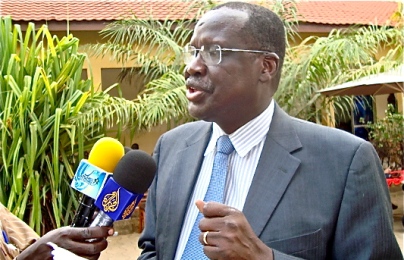S. Sudan hopeful of reaching deal over post secession disputes
January 25, 2013 (ADDIS ABABA/JUBA) – South Sudan on Friday expressed optimism on the possibility of reaching a “win-win” consensus on a list of sticking points with the government of neighbouring Sudan, after its president Salva Kiir met his Sudanese counterpart Omer Hassan Ahmed Al-Bashir for the second time this week in Addis Ababa, Ethiopia.

The meeting took place on the sidelines of an AU summit being held as part of efforts to tackle the ongoing crises across Africa, including the conflict between Sudan and South Sudan.
“We are doing well. There is no agreement yet, but there is a good progress. President Kiir has today met with president Bashir before [the] chairperson of the African High Level Implementation Panel,” Jok said.
The two sides have been unable to reach consensus on a number of contentious issues, including the formation of a joint legislative council in the oil-contested border region of Abyei, withdrawal of armed forces from the Safe Demilitarised Buffer Zone (SDBZ), claimed and contested areas and disarmament of rebel groups on both sides.
The official said his government was ready to break the deadlock, saying negotiations are about “give and take,” with some compromise needed from both sides.
“I know some people will say, ‘you said you will not move an inch on certain things’. This is not the objective of any meaningful negotiations. There must be consensus on both sides. This is what we are looking at. We have made significant progress on our side,” Jok told Sudan Tribune on Friday.
The presidential meeting comes after talks at the level of the joint political and security committee on the implementation of the buffer zone and other outstanding issues broke down earlier this week in Addis Ababa.
Disagreements between the two countries and a number of counter accusations have stalled the implementation of a cooperation agreement signed last September, covering security, border demarcation and the final status of the disputed Abyei area.
Chief among these is Khartoum’s refusal to allow the passage of South Sudan’s oil flows through its territory.
Khartoum has blocked the resumption of oil exportation until Juba disengages with Sudanese People’s Liberations Movement-North (SPLM-N) fighters, active in the border states of South Kordofan and Blue Nile.
Juba, however, maintains it has cut all ties with the rebel group, which fought alongside the South during a protracted civil war with the north prior to independence.
Also unresolved is the formation of the Abyei legislative council, with Khartoum rejecting South Sudan’s request for 12 of the 20 seats – as was the case before independence – saying it now wants a 50% share and only accepted the previous agreement to promote unity.
Minister of information and broadcasting services Barnaba Marial Benjamin confirmed high-level talks between the two heads of state have “successfully started” but “there are no details because they are still in discussion”, Marial told Sudan Tribune on Friday.
AU SUMMIT
As well as addressing the ongoing issues between Sudan and South Sudan the African Union summit is due to address renewed conflicts in the continent when it begins on Sunday.
Despite the optimistic theme of the summit – “Pan-Africanism and African Renaissance” – the agenda is expected to be dominated by the crises in Mali, where France and more recently some west and central African nations are fighting Islamist insurgents.
According to AU officials, the conflicts in the Central African Republic (CAR), Eastern Democratic Republic of Congo and Somalia are also on the agenda.
The African Union’s Executive Council, consisting of the the Foreign Ministers of member states, wrapped up their two-day ordinary Session on Friday by considering the draft decisions and declarations to be forwarded with recommendations for the actual Summit of Heads of State and Governments.
Newly-elected AU Commission chief, Nkosazana Dlamini-Zuma, has urged Africa and the international community at large to work together to tackle the conflicts that are preventing peace and development in Africa.
“It is my fervent hope that we maintain a proper and healthy balance between achieving peace and advancing development” she said.
“The continent cannot advance without succeeding on both fronts simultaneously.”
During the summit, African leaders will also elect new chair for the 54-member continental bloc. Government sources in Addis Ababa said Ethiopian new Prime Minister, Hailemariam Desalegn, is likely to takeover as AU chairperson replacing Benin’s President Yayi Boni.
RUSSIA
Russia’s envoy to Africa, Mikhail Margelov, is set to meet delegations and officials from South Sudan on the sidelines of the African Union summit before visiting Sudan, Niger and Morocco.
(ST)
